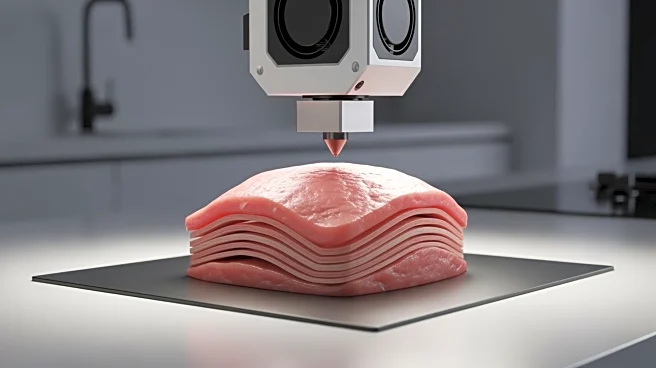What's Happening?
Campbell’s has terminated its Vice President of Information Technology, Martin Bally, following the release of a recording in which he allegedly claimed that the company uses meat from a 3D printer. The
audio, part of a lawsuit filed by a former employee, also includes Bally making racist remarks and describing Campbell’s food as 'bioengineered' and intended for 'poor people.' In response, Campbell’s issued a statement refuting the claims, asserting that their soups do not contain lab-grown or bioengineered meat, and that they source chicken from reputable suppliers in the U.S. that comply with USDA standards. The company updated its statement to confirm that Bally is no longer employed as of November 25th.
Why It's Important?
The incident highlights the challenges companies face in managing public perception and maintaining trust in their products. Campbell’s swift action to dismiss Bally and clarify their sourcing practices underscores the importance of transparency in the food industry. The controversy could impact consumer confidence, especially in an era where food authenticity and ethical sourcing are increasingly scrutinized. Additionally, the case reflects broader societal issues, such as the implications of corporate leadership making racially insensitive remarks, which can affect a company's reputation and stakeholder relationships.
What's Next?
Campbell’s may need to engage in further public relations efforts to reassure consumers about the integrity of their products. The company might also review its internal policies and training programs to prevent similar incidents in the future. Legal proceedings related to the lawsuit could reveal more details about the internal culture at Campbell’s, potentially prompting further organizational changes. Stakeholders, including consumers and industry watchdogs, will likely monitor the situation closely to assess Campbell’s commitment to ethical practices.
Beyond the Headlines
The controversy surrounding 3D-printed meat touches on broader themes of technological innovation in food production. While Campbell’s denies using such methods, the concept of lab-grown meat is gaining traction as a sustainable alternative to traditional meat production. This incident may spark discussions about the future of food technology and its role in addressing environmental and ethical concerns. Additionally, the case raises questions about corporate governance and the responsibilities of executives in shaping company culture and public image.








